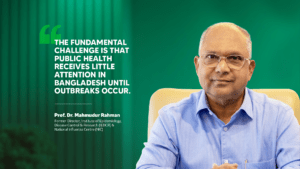I was born and raised in Bagura. I am sort of a small-town girl who is really shy. I used to shy away from things and was very studious when I was young. My father is a businessman; I have two siblings, and I’m the eldest.
I think when I was a kid, I used to carry out random acts of kindness, and I used to love doing so. Being kind to everyone or helping others has always been my thing. After graduating high school, I got admitted in Dhaka University where I did my undergrad on Finance. That’s when my life changed as I started to stay at the university dorm. From having your parents doting on you and others to help you get things done, I was suddenly alone doing things on my own. So, it seemed like a totally different world to me, and as I started to figure out things, it really helped me in my life. I believe that is the point in my life that made me who I am today.
When I got my undergrad degree, I went to USA for masters on Social Business at University of Colorado. I had an amazing mentor who used to tell me that I am a compassionate person and that I understand the development sector very well. He also asked me to pursue a career in it, and I considered it.
After being done with my masters, I got a job at a non-profit organisation for a small period of time. I learned as much as I could as I always wanted to do something on my own for which I needed to be knowledgeable and well-equipped. I had to understand how everything works and what should be worked on.
After that, I came back to Bangladesh and in 2015, I founded Amal Foundation. Everyone wanted me to stay back in USA, but I wanted to come back and do things on my own. Everyone was scared for me. But I was adamant about what I wanted to do.
At the foundation, I have a few volunteers who constantly help me. We started working on the slums in Dhaka and eventually in the North Bengal chawls. We started growing as an organisation and people started putting their trust in us. Right now, we are working on projects in the North Bengal chawls where we have schools, healthcare centres and we are running many healthcare projects. We are also working with the Rohingya refugees, as well as many small projects all around the country.
My passion is to work for women and children. And when I’m not working, I like reading books, learning new things, connecting with people, dancing, and cooking.
You sound like an all-rounder. Is there anything you can’t do?
I’m not really an all-rounder, I just like staying busy.

What does it mean to you to be enlisted on Forbes 30 under 30?
It feels really great; I am honoured. But I also see it as a responsibility to be good and do more for my community, my country. I want to work on it, I want to make sure that all my team members and everyone dependent on me are getting the best output from me. I’m not being carried away by the title or anything; I just want to stay humble and careful in terms of my work.
So, what exactly do you think you did to get to this point? What do you think made you reach this height of success?
I think the word “success” is a very big word to be given to me. I prefer to be known as a person who has a purpose in life, which is to help underprivileged women and make sure they are empowered. So, I’d definitely say it’s my resilience. I failed several times, but I stood up, shook it off and started working again. So, I’d say resilience is really important. Another thing would be confidence. And I think you should always be greedy in the sense that you should always want to learn new things. Moreover, trusting the Almighty and being positive took me where I am today.
How did Forbes find you?
There’s this man who writes speeches for Amal Foundation. He is a student of Mymensingh Agriculture University. One day, he shared this idea with me to apply, telling me that it’d be good for me. So, I just randomly applied, because I thought the chances of getting selected were very slim.

How do you think this changes the game for you?
I think it’s going to bring a big change in my life in terms of getting more attention to my work, to my opinions. It’s an era in which everyone has an opinion that they are announcing through social media and active platforms. I think mine will be heard and my work will be appreciated in a larger scale. So, in that sense it is changing the game. However, it’s also putting a lot of responsibility on my shoulder.
So, you do feel more pressurised after winning the title?
I won’t lie; of course, there is pressure. The journey of being a leader means always being under pressure. I have definitely faced many stressful moments in my journey. When I founded Amal Foundation, I had a different kind of pressure than I do now. I think I have learned how to deal with different magnitude of pressure, so I’m guessing I’ll be fine.
What was your vision when you started?
My vision was crystal clear, which was to help create a country where women will be recognised, respected and allowed to live the life they want to. So that’s what I’m working towards. It’s not only for women living in urban areas, its also for those living in slums or chawls, those who don’t have access to proper education, and all underprivileged women.

What are your upcoming projects?
Our foundation works regarding education, healthcare, and emergency-based situations. And, considering the current situation, we are working on projects to address the problems and find their solutions. We are working on hygiene-related projects, to share awareness among the underprivileged people. We are also helping them with rations and whatever support they need to run their household. Also, we are discussing projects that can be worked on after the crisis is over.
How are you planning to carry out the hygiene-related projects when everyone is quarantined, and gatherings are not allowed?
We are actually discussing everything on digital platforms, and the necessary payments are being done through bKash. We are trying to get PPE for our volunteers and preparing guidelines. I am well connected to my volunteers who are going to do the field work and basically running the show.
What is the secret to your success?
Again, the word “success” is a bit overwhelming. I won’t say I’m successful, there isn’t a proper scale to measure success. I think you could say that I have gained accomplishments, for which I had to be resilient, had to believe in myself because there were times when I was depressed and I was struggling, and it was blessing from the Almighty and from my friends and family. I believe that when you are doing something good, you will get a thousand times more in return.
If you had to give advice to your juniors, what would it be?
I feel that there are two things that are missing in our youth. One is compassion, which doesn’t mean that you’ll only be kind to those who you like or respect, but be kind to everyone you come across, including the rikshaw-pullers. I would advise them to be more empathetic. Second would be persistence. You can’t just give up after trying once, you have to be resilient and keep at it.
How do you think the youth can contribute to the current pandemic?
The current situation is pretty confusing as we haven’t really faced anything like this before. It’s not just being faced by one individual country or community, but by the entire human race.
It can be scary, but I would like to tell them to not get overwhelmed, and to not let it get the best of them. They don’t have to help the entire world or even the entire nation. I’d just ask them to consider helping those around them. You don’t always have to help by donating food or money, you can easily check up on your elderly relatives or even your friends to comfort them all.
I would ask them try to share awareness and to be a good citizen. For example, they could make sure that the ones who are going outside of the house for essentials or emergency cases, those people are not the reason why someone else is harmed in the community.
They could also use this time to hone their skills and practice whatever they want, and not going out of the house.
Do you have any specific reason as to why you named your foundation “Amal Foundation”?
Yes, of course. “Amal” is an Arabic word which means “hopeful”. Whenever there is despair, I still believe there is hope for a better tomorrow. Hence, I named it “Amal Foundation”.






